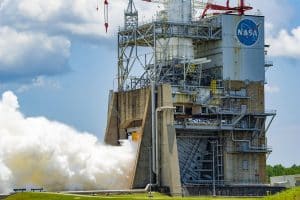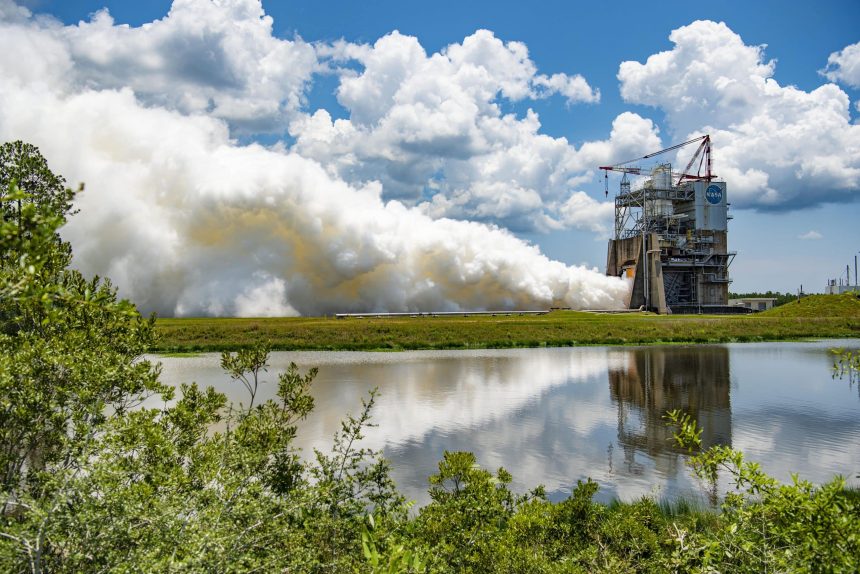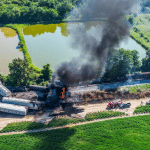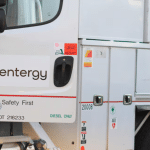NASA’s Stennis Space Center achieved a key milestone on Thursday after completing an initial certification test series of the new RS-25 engines.
An RS-25 certification engine, which will be used to power the Space Launch System (SLS) rocket on future Artemis missions to the moon, went through a full-duration test of more than eight minutes.
The test series on the Fred Haise Test Stand at Bay St. Louis’ Stennis Space Center is designed to verify that the new engines meet all Artemis flight requirements.
“This certification test series for the redesigned engine sets the stage for a new chapter of spaceflight history for the RS-25 engines and future flights of the SLS rocket,” Johnny Heflin, SLS liquid engines manager, said. “The newly redesigned RS-25 engines leverage advanced manufacturing techniques and innovative designs while increasing the engine’s performance as NASA aims to establish a sustainable presence on the Moon and prepare for future missions to Mars.”

Four RS-25 engines fire simultaneously to produce more than two million pounds of combined thrust to help launch the rocket. NASA has awarded Aerojet Rocketdyne contracts to provide 24 new engines, which will help power six SLS launches.
Only one more certification series remains before the engines are ready to be used in the Artemis V mission to the moon.
“Testing new hardware always is a learning process, even on an engine as proven as the RS-25,” Chip Ellis, manager of the RS-25 Engine Test Project at NASA Stennis, said. “The success of this series really is a testament to NASA’s commitment to ‘test as we fly’ and to the expertise of the test team.”
The recent certification series included:
- Almost 110 minutes of cumulative hot fire duration. Each of the 12 tests fired for at least 8 minutes (500 seconds) and several for even longer to fully characterize engine performance. the 500-second tests simulate the same amount of time the engine must perform to lift SLS and astronauts aboard the Orion spacecraft to orbit. The engine approached 2 hours (6,570 seconds) of cumulative hot fire time during the series.
- Four long-duration tests. Operators conducted a pair of 10-minute tests, as well as 10-and-a-half minute and 12-minute hot fires, during the series. The 720-second test represented the longest-ever hot fire of a modified RS-25 engine.
- An aggressive gimbal test. Halfway through the campaign, operators conducted a gimbal test of the engine to ensure it will pivot as needed to maintain SLS stability and trajectory during flight. Operators moved the engine by as much as 6 degrees from the center on a tight circular axis and in a back-and-forth pattern to demonstrate the gimbaling capability.
- A wide range of power levels. Operators fired the RS-25 engine from 80% to 113% power levels to test the performance of the engine in various scenarios The first four Artemis missions use modified space shuttle main engines that can power up to 109% of their rated level. New RS-25 engines will power up to the 111% level to provide additional thrust. Operators tested up to the 113% power level during a number of certification hot fires to learn about the engine’s capabilities and to provide a margin of operational safety.
- State-of-the-art components. The certification engine featured various components manufactured with advanced processes and techniques, including a main combustion chamber using hot isostatic pressure bonding, an improved nozzle brazing process, new flex hoses, and numerous 3D-fabricated components. The certification hot fires demonstrate the performance capabilities of the new components.
Stennis Space Center conducts 10th hot fire test of Artemis RS-25 engines








